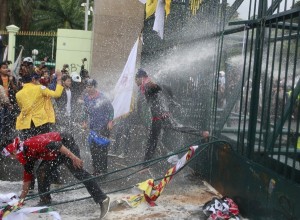
Student protesters are sprayed by a police water cannon truck as they try to pull down the gate of the parliament building during a protest against the government's plan to raise fuel prices in Jakarta, Indonesia, Thursday, March 29, 2012. The Indonesian government plans to raise fuel prices by about 33 percent next month to avoid a budget deficit due to expensive fuel subsidies. AP PHOTO/DITA ALANGKARA
JAKARTA—Indonesian police fired tear gas and water cannon Thursday to disperse stone-pelting protesters who rallied against a planned fuel price hike, as the parliament prepared to vote on the proposal.
The government says that with global oil prices soaring above $100 a barrel, the nation can’t afford to maintain heavy subsidies, and parliament is expected Friday to approve raising the fuel price by a third.
Demonstrations involving thousands occurred nationwide, with outbreaks of violence reported in some big cities.
Hundreds of students clashed with security personnel outside parliament in the capital Jakarta, hurling stones at police and soldiers who retaliated with tear gas and water cannon.
Around 2,000 members of Hizbut Tahrir – a prominent religious group in Indonesia which is the world’s biggest Muslim-majority nation – also protested outside the presidential palace in Jakarta.
Men wearing Muslim caps and women in headscarves chanted “Replace, replace this rubbish system” and carried banners that said “Reject the fuel price hike! Rulers are liars, wicked and traitors.”
“This is a wicked government that doesn’t care about the people’s welfare,” Irwan Saifullah, a 42-year-old teacher, told AFP outside the presidential palace.
“My kids will have to drink less milk and we’ll all eat less rice,” he said.
Around half of Indonesia’s population live on less than $2 a day.
The government has said that without hiking the fuel price, the cost of subsidies will push the country’s budget deficit above the three percent of GDP cap stipulated by law.
But disgruntled Indonesians have launched protests in major cities across the country in recent weeks, fearing the hike – from Rp 4,500 (49 cents) to Rp 6,000 per liter – will push up prices of everyday items.
“Everything will become more expensive. It just means misery,” said Nining Elitos, chairman of the Indonesian Trade Unions Alliance.
In Makassar city on Sulawesi island, around 1,000 students blocked several main roads and set fire to a banner bearing pictures of President Susilo Bambang Yudhoyono.
Local TV stations showed images of protesters outside local parliament in Pekanbaru city on Sumatra island hurling stones at police, who responded with batons and water cannon.
Amid tight security only a few thousand protesters turned up in the capital, but almost 10,000 people reportedly showed up in other cities including Medan in Sumatra island and Surabaya in eastern Java.
Around 14,000 police and 8,000 soldiers deployed in Jakarta alone at key locations, including parliament house, the presidential palace and the international airport.